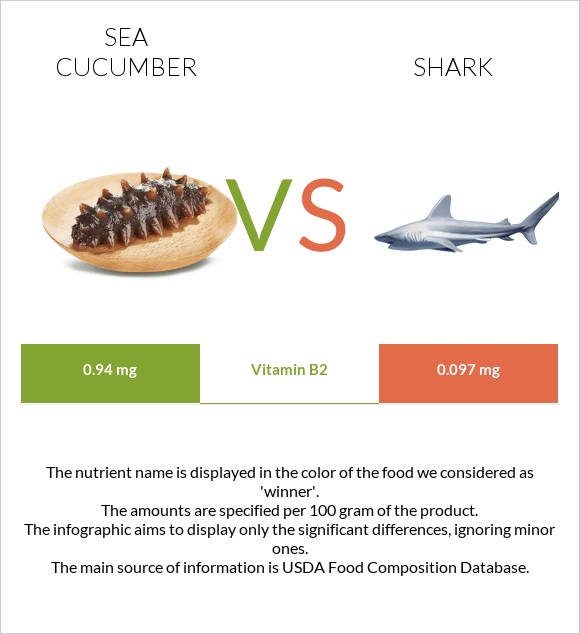Sea cucumber vs. Shark — In-Depth Nutrition Comparison
Compare
What are the main differences between sea cucumber and shark?
- Sea cucumber is richer in vitamin B2, yet shark is richer in iron.
- Sea cucumber's daily need coverage for vitamin B2 is 65% higher.
We used Sea cucumber, yane (Alaska Native) and Fish, shark, mixed species, cooked, batter-dipped and fried types in this comparison.
Infographic

Infographic link
Mineral Comparison
Mineral comparison score is based on the number of minerals by which one or the other food is richer. The "coverage" charts below show how much of the daily needs can be covered by 300 grams of the food.
| Contains less SodiumSodium | -100% |
| Contains more CalciumCalcium | +66.7% |
| Contains more IronIron | +85% |
Vitamin Comparison
Vitamin comparison score is based on the number of vitamins by which one or the other food is richer. The "coverage" charts below show how much of the daily needs can be covered by 300 grams of the food.
| Contains more Vitamin B2Vitamin B2 | +869.1% |
| Contains more Vitamin B3Vitamin B3 | +15% |
| Contains more Vitamin B1Vitamin B1 | +44% |
All nutrients comparison - raw data values
| Nutrient |  |
 |
DV% diff. |
| Vitamin B2 | 0.94mg | 0.097mg | 65% |
| Selenium | 34µg | 62% | |
| Vitamin B12 | 1.21µg | 50% | |
| Phosphorus | 194mg | 28% | |
| Polyunsaturated fat | 3.701g | 25% | |
| Vitamin B6 | 0.3mg | 23% | |
| Fats | 0.4g | 13.82g | 21% |
| Cholesterol | 59mg | 20% | |
| Saturated fat | 3.205g | 15% | |
| Monounsaturated fat | 5.935g | 15% | |
| Vitamin B5 | 0.62mg | 12% | |
| Protein | 13g | 18.62g | 11% |
| Magnesium | 43mg | 10% | |
| Calories | 56kcal | 228kcal | 9% |
| Iron | 0.6mg | 1.11mg | 6% |
| Vitamin A | 54µg | 6% | |
| Potassium | 155mg | 5% | |
| Copper | 0.042mg | 5% | |
| Sodium | 122mg | 5% | |
| Zinc | 0.48mg | 4% | |
| Folate | 15µg | 4% | |
| Vitamin B3 | 3.2mg | 2.783mg | 3% |
| Carbs | 0g | 6.39g | 2% |
| Calcium | 30mg | 50mg | 2% |
| Manganese | 0.05mg | 2% | |
| Vitamin B1 | 0.05mg | 0.072mg | 2% |
| Net carbs | 0g | 6.39g | N/A |
| Tryptophan | 0.212mg | 0% | |
| Threonine | 0.843mg | 0% | |
| Isoleucine | 0.867mg | 0% | |
| Leucine | 1.515mg | 0% | |
| Lysine | 1.634mg | 0% | |
| Methionine | 0.541mg | 0% | |
| Phenylalanine | 0.75mg | 0% | |
| Valine | 0.965mg | 0% | |
| Histidine | 0.538mg | 0% | |
| Omega-3 - EPA | 0.258g | N/A | |
| Omega-3 - DHA | 0.431g | N/A | |
| Omega-3 - DPA | 0.089g | N/A |
Macronutrient Comparison
Macronutrient breakdown side-by-side comparison
Protein:
13 g
Fats:
0.4 g
Carbs:
0 g
Water:
80.7 g
Other:
5.9 g
Protein:
18.62 g
Fats:
13.82 g
Carbs:
6.39 g
Water:
60.09 g
Other:
1.08 g
| Contains more WaterWater | +34.3% |
| Contains more OtherOther | +446.3% |
| Contains more ProteinProtein | +43.2% |
| Contains more FatsFats | +3355% |
| Contains more CarbsCarbs | +∞% |





